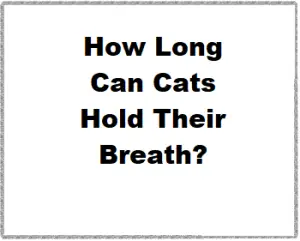How Long Can Cats Hold Their Breath?
Cats are fascinating creatures with a wide range of physical abilities and behaviors. One question that often arises among cat owners and enthusiasts is how long cats can hold their breath. Let’s delve into this intriguing topic and explore the surprising capabilities of our feline friends.
The Respiratory System of Cats
Before we dive into the duration cats can hold their breath, it’s important to understand their respiratory system. Cats, like other mammals, have lungs that facilitate the exchange of oxygen and carbon dioxide.
When a cat breathes in, air enters through its nose or mouth and travels down the trachea, which branches into two bronchi leading to the lungs. Within the lungs, oxygen is absorbed into the bloodstream, and carbon dioxide is expelled through exhalation.
The Cat’s Ability to Hold Its Breath
Unlike marine mammals such as dolphins or seals, cats are not designed for extended periods of breath-holding. They lack specialized adaptations like extra oxygen storage capacity or the ability to slow their heart rate significantly.
On average, a healthy cat can hold its breath for approximately 30 to 40 seconds. However, it’s important to note that this time can vary depending on several factors, including the cat’s physical condition, activity level, and stress levels.
Some cats may be able to hold their breath slightly longer, while others may have a shorter breath-holding duration. These differences can be influenced by individual factors such as breed, age, and overall health.
Why Do Cats Hold Their Breath?
Cats may hold their breath in certain situations, although it is typically not a deliberate action. One common scenario is when they are concentrating on something, such as stalking prey. Holding their breath momentarily helps them focus and remain undetected by their target.
In addition, cats may hold their breath if they are feeling anxious or stressed. This behavior is often observed during veterinary visits or when they encounter unfamiliar environments. In such situations, the cat’s heightened alertness can lead to a temporary suspension of normal breathing.
Factors Affecting Breath-Holding Duration
Several factors can influence how long a cat can hold its breath. These include:
- Physical fitness: Cats that are in good physical shape tend to have better respiratory endurance and may hold their breath for slightly longer durations.
- Activity level: Cats that engage in regular physical activity and play may have increased lung capacity and better breath control.
- Environmental conditions: Extreme temperatures, high humidity, or poor air quality can impact a cat’s ability to hold its breath effectively.
- Stress and anxiety: Cats under stress or in high-stress situations may have shorter breath-holding durations due to increased respiratory rate and tension.
It’s important to consider these factors when observing your cat’s breath-holding behavior.
Frequently Asked Questions
1. Can cats hold their breath underwater?
No, cats are not naturally equipped to hold their breath underwater. While they may exhibit brief breath-holding behavior, they are not capable of prolonged submersion like marine mammals.
2. How can I tell if my cat is holding its breath?
Cats typically do not display obvious signs of breath-holding. However, you may notice a
a momentary pause in their breathing pattern or stillness in their body when they are intensely focused or in stressful situations.
3. Should I be concerned if my cat holds its breath for longer than usual?
If your cat is consistently holding its breath for longer durations or displaying abnormal breathing patterns, it’s advisable to consult with a veterinarian. Prolonged breath-holding or respiratory irregularities may indicate an underlying health issue that requires professional attention.
4. Can training improve a cat’s breath-holding ability?
While cats can adapt and improve their physical fitness through training, their natural breath-holding capacity is limited. Training activities that promote agility and cardiovascular health can indirectly enhance their overall respiratory function.
Conclusion
While cats may not possess the same breath-holding capabilities as marine mammals or certain other animals, they still can briefly suspend their respiration. On average, a healthy cat can hold its breath for about 30 to 40 seconds, although individual variations exist.
Understanding the factors that influence a cat’s breath-holding ability can help us appreciate their unique physiology. Remember to provide a stress-free environment for your cat and monitor their breathing for any signs of respiratory issues. By doing so, you can ensure the well-being of your feline companion and enhance your bond with them.
Cats continue to amaze us with their incredible capabilities, and exploring their breath-holding abilities is just one example of the wonders of the feline world.

